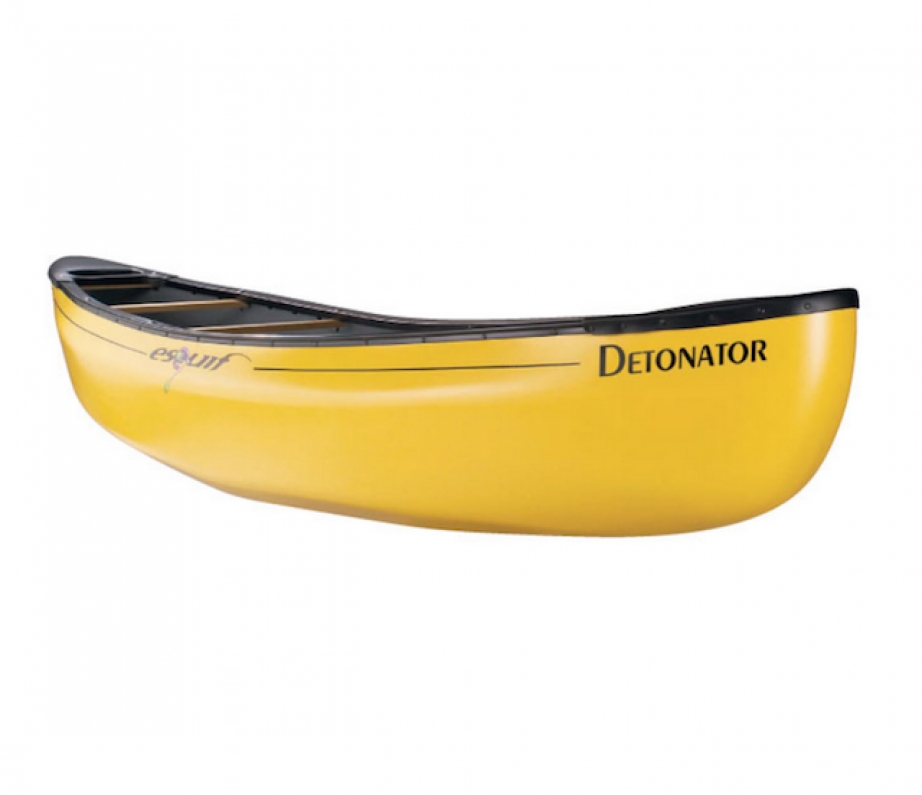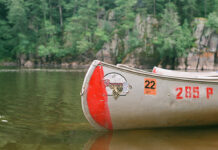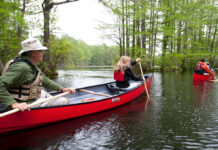We had paddled Esquif’s first whitewater solo canoe, the Nitro, two years ago in a comparison test between the aging Dagger Ocoee and the newer Phantom. We found the Nitro had some fantastic performance characteristics such as solid secondary stability and a dry ride, but it was longer and consequentially more in line with the Rival and Genesis. The Detonator, at first glance looks like a shorter, 10-foot Nitro, but there is more to this new boat than first meets the eye.
Esquif has answered the call for a shorter open boat and has kept many of the charms of the Nitro. The most obvious are the completely flat bottom and four-inch double chine. This combination gives the Detonator a different feel. It doesn’t have primary stability as we are used to, rather it wants to fall to its early and bomber secondary stability.
The Detonator isn’t tippy, rather it is just more stable tilted slightly to one side or the other. The style of paddling is different from the smooth transition of rounded hulls; you are always tilted, which is okay because in whitewater that is most often the case. This is especially strange for timid paddlers reluctant to commit to a full tilt.
Esquif Detonator Specs
Length: 10’
Beam: 28”
Gunwale: 24”
Bow/stern depth: 23”
Centre depth: 17”
Bow rocker: 5”
Stern rocker: 6.5”
Weight: 46 lbs
Material: Royalex
Hull design: asymmetric
MSRP CAD: $1200 for shell
Front and side surfing is still a huge part of solo open boating and an area the Detonator shines. At only 10 feet, the detonator is nimble and tons of fun on short steeper waves.
The rounded, blunt bow is easy to keep free of the upstream current. The secondary stability is ideal for offside tilting for quick changes in direction on a wave. The double chine provides incredible forgiveness across eddylines and has the same soft effect that helps when side surfing in a hole.
Another interesting characteristic of the Detonator is that Esquif has shortened the thwarts in the bow to produce an asymmetrical shape. Boat builders determined long ago that boat speed is based on a number of factors; one is waterline length and another is the shape of the footprint. Esquif has changed to a faster asymmetrical shape to compensate in speed for the Detonator’s shorter length.
The narrower bow also makes the execution of strokes easier, and it makes us wonder why solo canoes have always been so wide. Further improving the ease of paddling, the sheer or gunwale line is almost level, making crossing the deck much cleaner and allowing the Detonator to fully turtle instead of getting caught on your offside when rolling. Like the Nitro, the Detonator rolls up with a minimum amount of water on board.
The bottom line
Esquif is marketing the Detonator as an advanced paddler’s or expert’s boat for Class III rivers and up. We think more advanced paddlers will have to try the Detonator first because its appeal depends on individual paddling style. We are sure they will enjoy the quick pivot turns of a short boat, the narrow asymmetrical design for efficiency, and the stability that will allow them access to more challenging runs without the worry of catching a hard chine.
On the other hand, many advanced paddlers look for a hard chine as a desirable carving characteristic on solo boats. The largest market and the best fit for the new Esquif Detonator may be aggressive intermediates and smaller paddlers who are sick of pushing around larger solo canoes.








